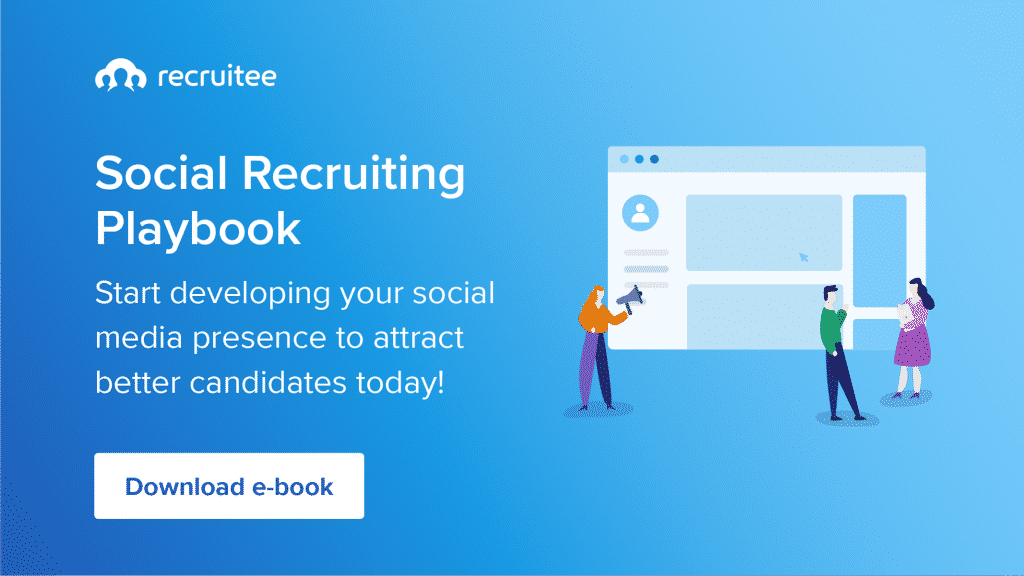They’re young, hungry, and ambitious.
With an average attention span of 8.25 seconds.
And they’re destined to change the workforce as we know it.
Welcome to Generation Z.
Who are Generation Z?
Gen Z are categorized as those born between 1995 and 2000. They’ve been entering the global workforce for a while now, mainly in internship and entry-level positions, and they’re nothing like their predecessors in terms of what they expect from, and value in an employer.
Understanding Gen Z’s values and attributes will make recruiting top prospects more achievable.
Below we examine some of their identifying features and how you (as an employer!) can align with them.
Ultimate technology natives
Unlike millennials who saw the internet creep into their lives bit by bit, Gen Zers grew up with smartphones in their hands, giving them instant access to everything. According to the 2018 Global Web Index, they average four hours a day on their mobile phones, over 20 mins more than their millennial counterparts. They also attach great importance to the technological sophistication of an organization. Almost 90% of them said this would directly impact their decision of whether to work for a company.
In practice: Employers need to keep in mind that Gen Zers can summon a ride, order delivery, do their banking, and even buy a car with a couple of swipes on their smartphones. That means organizational tech in general, must be able to accommodate this ‘everything in my pocket’ mindset.
This can be achieved by making key functions like HR onboarding, benefits enrollment, time tracking, training, and project management mobile-first.
Personal space
Previous generations might’ve viewed remote working as something out of the norm. However, Gen Z’s view remote work as the norm, and not a perk. According to a recent survey by HR researchers Inavero and freelancer site Upwork, 73% of all teams are expected to have remote workers by 2028.
In practice: Organizations looking to attract these youths should aim to provide access to remote work, and flexible schedules. You can also check out tools that make remote working possible such as Google Drive, Zoom and Trello. Because Gen Z is so tech savvy, they can even recommend technology that will help improve your business, so take their advice to heart when they come to you with automation ideas.
Pragmatism over idealism
Gen Zers remember the economic crisis from 2008 and the impact it had, directly or indirectly, on their families. Unlike their millennial predecessors, who are more purpose-oriented when it comes to their professional choices, Gen Z attaches great value to a certain level of job security and professional career development.
In practice: Many companies try to attract Gen Z candidates by offering perks like unlimited coffee, free lunches, and a dog-friendly office. While cool perks may make you stand out, what will really attract and retain Gen Zers is growth opportunities.
According to LinkedIn, Gen Zers are chiefly motivated by financial incentives and career advancements, and nearly 60% are interested in learning professional skills in order to make more money, so be sure to provide means for enhancement.
For instance, at Recruitee, every employee is awarded €1,500 each year to spend on continuing education and professional development.
Audio-visual generation
Gen Zers are less likely than millennials to be Facebooking, Pinteresting, or Tweeting, and more likely to be Instagramming, Snapchatting, and more recently, Tik Tokking (a short-form video app). Up to 60% of Tik Tok users are Gen Z. Why? Because these are the platforms that offer the richest audio-visual experiences and the smoothest user interface, according to the 2018 Global Web Index.
In practice: Most recruitment videos tend to be quite dry. However, one example of a highly engaging and immersive recruitment video experience is Deloitte’s: ‘A Day in the Life’, which allows users to choose how they’d react to a number of different work-based scenarios. From telling a coworker about spilled coffee on their jacket, to what to do if a printer breaks – each one highlights the various skills and attributes valued by the company.B
ecause Generation Z is bombarded with information online at all times, you need to make sure your job postings catch their attention by keeping them short, engaging and mobile-friendly. Consider adding a video that informs potential candidates about life at your company via testimonials from current employees or maybe even a quick office tour. Video job ads are an effective way to grab the attention of a generation accustomed to consuming visual content on social media.
Distrusting of companies
Less than half of global professionals trust their current employers, according to Ernst & Young’s ‘Trust in the Workplace’ report. For Gen Z, integrity is paramount as this is a group that has been marketed to from day one, surrounded by advertisements and brands trying to win their attention and their loyalty. Up-and-coming workers expect their employers to be genuine and candid, and if you’re not offering that, they’ll be quick to sniff you out.
In practice: To a Gen Z employee, a trustworthy boss is someone who treats them with respect, conducts business ethically, actively works toward equality and inclusivity, and communicates with transparency. As an employer, it’s vital you don’t make promises you can’t keep. When seeking to build trust with young employees, confusing high-touch support with micromanagement is a deadly mistake. Gen Z workers want leaders who will empower them and trust them enough to point them in the right direction.
Independence over collaboration
It’s been common workplace wisdom for years now that millennials value collaboration in the office. This thinking has led to the rise of open offices and workplace messaging systems like Slack. But it is a mistake to extend this same logic to Gen Z, who are more independent than the generations that preceded them.
In practice: Managers and recruiters at all levels should begin looking at ways to keep the structure of teams, but also allow for greater independence and autonomy for Gen Z employees. This may mean holding fewer large meetings and more one-on-one meetings. Giving Gen Z employees the chance to play with new ideas will also allow them to spread their wings and create a culture of innovation in your business.
Are you ready for Gen Z?
As we’ve examined, Gen Zers have new expectations and demand different things from employers. In order for you to find success with this new generation, understanding and adapting communication styles to their high-tech needs are crucial. Failure to properly manage Gen Z will have a massively detrimental effect on an organization’s ability to recruit and keep talented people.
So, as you’re assessing your recruitment strategies for the coming year, ask yourself, Gen Z or millennial: which generation are you actually talking to?
—






.jpg?width=1000&name=6797cc6580ed37f294dde1be_pexels-linkedin-sales-navigator-7245806%20(1).jpg)


